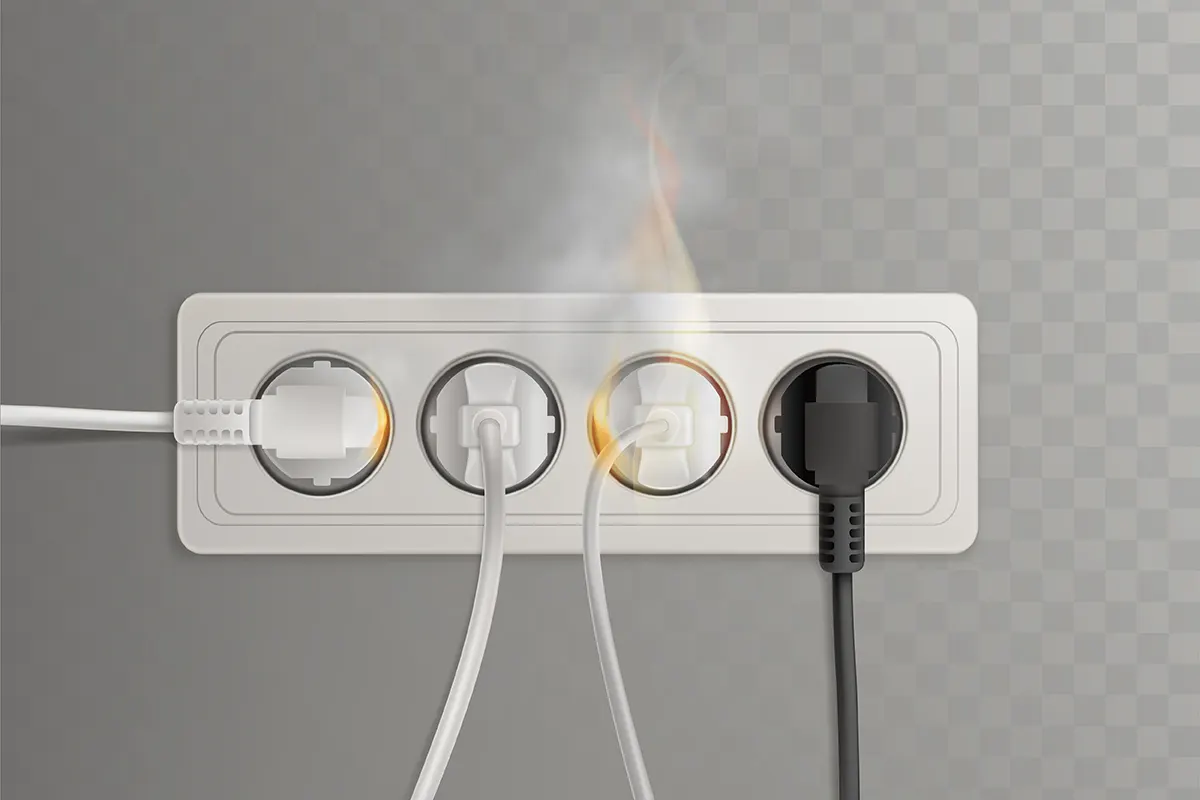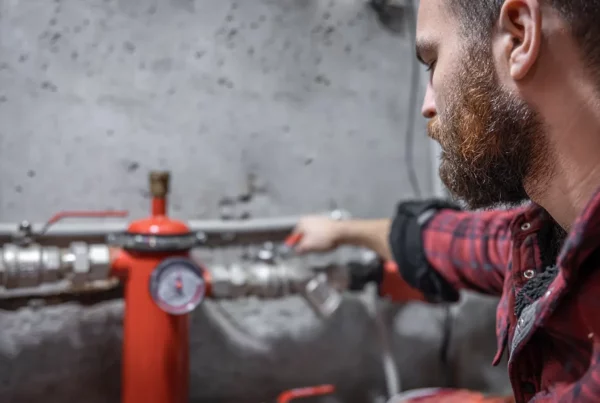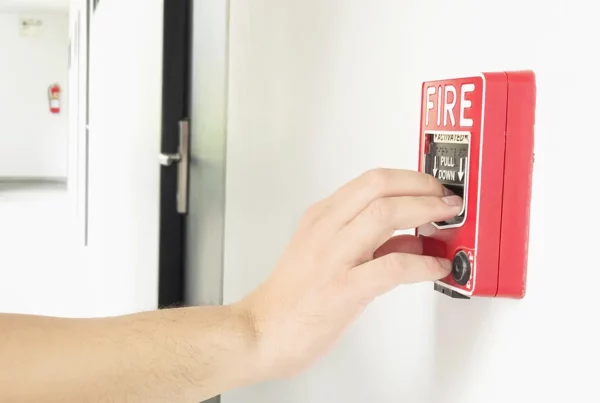
It is a common problem with electrical components. It is a common problem many people face, especially when appliances are switched on in the house. Electrical components such as switches, sockets, and fuses can start to give off an electrical burning smell that may be unfamiliar to many people. When this happens, it usually indicates a problem with the appliance or wiring and should not be ignored.
Overloaded circuit
One of the most common causes of electrical burning smell is an overloaded circuit. It is especially true in older houses where the wiring may be outdated and not built to handle the current load caused by modern appliances such as vacuum cleaners, blenders, and microwave ovens. Some circuits may also be wired for a single outlet and not multiple outlets. When this happens, the electrical wiring can overheat, causing parts of it to melt or start a fire.
Loose or frayed wires
Another common cause of the electrical burning smell is often caused by worn-out wiring or loose wires that rub against each other and create friction due to sparking. The friction causes the wires to heat up, causing the circuit to heat up, and the part of the wire touching each other will melt. It may also be a cause of electrical burning smell in appliances on circuit breakers or metallic fixtures (such as switches) because the copper in these fixtures can be oxidized by air and cause a foul odor.
Faulty electrical system
When there is a malfunction in the wiring system, it can create either an overload or short-circuit problem. An overload can be caused by loose wires coming together from fraying or too many appliances being plugged into one outlet (for example, two electric fans plugged into one outlet against standard safety regulations). A short circuit can be caused by anything that touches the wires when they are in a circuit, such as a screw or even the person touching them. The melted part of the wire will burn on contact. It can create an electrical burning smell and cause a fire that must be removed from the circuit (and possibly from the house).
Faulty wiring
A faulty wiring system can cause many problems, including overloads and shorts, as well as dangerous situations in which wires are exposed to high temperatures. These conditions may lead to overheating and damage to wires. In these cases, there will always be a foul smell of burnt plastic, rubber, or cloth from inside or outside a house.
Defective appliance
Sometimes, the problem stems from the appliance itself and not the wiring. For example, a defective switch or a broken fuse can create an overload or short-circuit problem that leads to an electrical burning smell or fire. In these cases, if you smell an electrical burning smell coming from an appliance plugged into the wall socket, unplug it immediately and have it inspected by a professional electrician.
Rainwater inside switches and sockets
As houses get older and exposed to direct sunlight for long periods, rainwater can invade through cracks in walls and ceilings. Rainwater may also seep into the wall sockets and switches, causing them to rust and rot. It can cause a burning smell to emanate from the socket or switch, usually when the appliance is turned on. Sometimes it escapes as a burned odor; other times, it can emit a burning odor that permeates and fills the house. In these cases, the electrical system will have to be checked by an electrician to ensure it is safe and that there are no electrical faults.
Electrical line fault
Electrical connections are sometimes faulty or damaged by falling objects from trees or lightning strikes on wires (electricity travels through metal quickly). Malfunctioning electrical connections can create a burning smell and even start a fire. In these cases, it is essential to have the electrical wiring checked by an electrician. An electrician can determine the problem and what steps need to be taken to reroute power away from the damaged area or replace arcing wires.
Faulty sockets or switches
Another contributing factor in generating an electrical burning smell is faulty sockets, electronic switches on circuit breakers, or other electrical fixtures that allow the wires to touch each other when turned on. It causes friction, which, if not attended to immediately, acts as a short circuit, causing parts of the wiring system (wiring fixtures) to melt and catch fire.
Faulty sockets or electrical fixtures
The sockets and switches that create the problem may be faulty. Suppose the smell is coming from a switch, circuit breaker, or another part of an electrical system that is not being used. In that case, it means that there is a problem with the wiring and must be taken care of immediately by an electrician.
Faulty appliances that are plugged into the wall socket
If one appliance continually emits an electrical burning smell when turned on, it is possible to check this with a tester on the outlet itself. Any problems with the socket, such as rust or damage to coating due to moisture damage, will emit a burning odor from inside it.
How To Stop Electrical Burning Smell
1. In case of an electrical burning smell in your house, try removing all unnecessary electrical appliances, especially those not currently turned on. An overloaded circuit often causes an electrical burning smell. If appliances are not being used or are turned off, they will not be contributing to the electrical overload.
2. Check your switch/socket/circuit breaker and make sure it is working correctly and generating enough electricity to handle the loads from your baseboard heating system, ceiling fans, and other similar devices in the room that have been installed in your home. Permanently close any window covering if left open for extended periods for ventilation; this allows air circulation and prevents excessive air humidity from building up inside electronic mechanisms.
3. Check your wiring and make sure it is not corrupted or damaged in any way. If it is, there are two possible causes:
* If your wires are damaged due to excessive corrosion, this will create a short circuit which may melt the insulation on the wires resulting in the smell of burning plastic and maybe catching fire. (While melting wires isn’t common, it happens occasionally.)
* Metal dust from rusting electrical fixtures, fuses, and switches can also cause smells such as burning plastic in metal contacts on pin-type switches.
4. Check the exhaust fans in your kitchen or bathroom, and ensure they do not emit an electrical burning smell. If necessary, clean the filters and make sure it is working correctly.
5. Check for any leakages or other defects in your pipework system. In some cases, this could be one of the leading causes of the electrical burning smell from within a house; the leaking water can soak some of the wiring system components that are exposed to it, causing them to corrode or become damaged and emit burn smells.
6. If the burning smell comes from your appliance, try restarting it and checking if the problem is resolved. If not, try another appliance or outlet in your home to see if they are also causing the problem. If this works, it helps rule out other appliances as possible causes of a smoky electrical burning smell in your home.
7. If you find that a burning smell is coming from other parts of your house, such as water pipes or refrigerant lines inside an air conditioning system, there could be a leak somewhere along those lines that need to be fixed, so it is always essential to have a reliable plumbing company inspect these pipes for leaks before spending time and money replacing them all over again.
8. You may need to call in a professional when the electrical burning smell is coming from appliances such as your oven, dishwasher, or other electrical equipment because they may not be safe to be used anymore due to damage caused by corrosion shorts, and other problems. Having these appliances checked out thoroughly by a licensed electrician is always essential before using them again in your home.
Some leading causes of burning smells in a home include faulty wiring, broken equipment, and damage caused by excess moisture content. As the causes are numerous and can be challenging to identify by an untrained person, it is essential to contact a licensed electrician to determine what steps need to be taken to remedy the problem.
Short circuit vector created by vectorpocket – www.freepik.com









